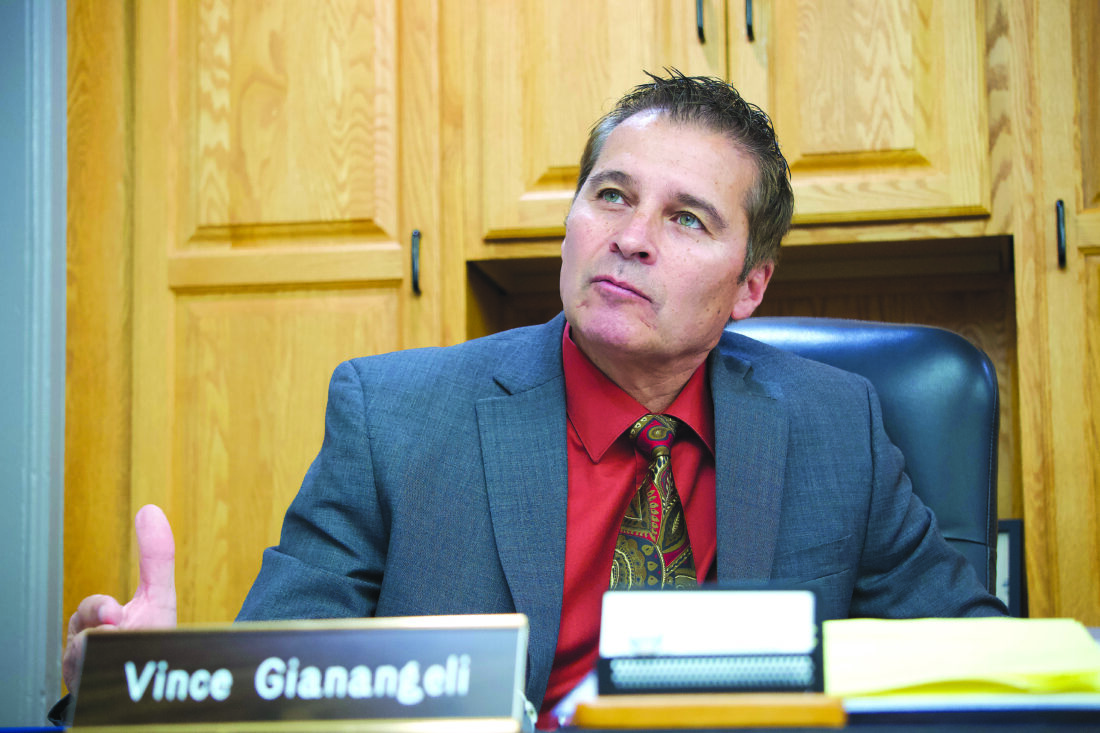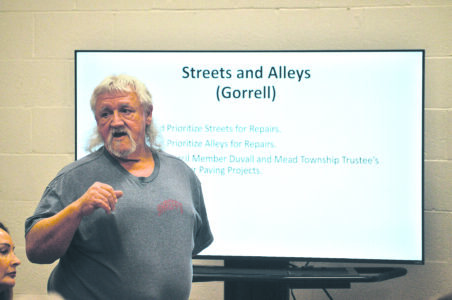November SNAP benefits possibly in peril

T-L Photo/GAGE VOTA Belmont County Commissioner Vince Gianangeli says that he is optimistic that the current government shutdown will end sooner than later.
- T-L Photo/GAGE VOTA Belmont County Commissioner J.P. Dutton says that the Board of Commissioners have total faith in Belmont County Department of Job and Family Services director Jeff Felton’s ability to provide continuous updates to the board about the ongoing government shutdown.
ST. CLAIRSVILLE — Belmont County Board of Commissioners continue to monitor the federal government shutdown — and are worried as Supplemental Nutrition Assistance Program benefits for November likely won’t be distributed because of it.
The federal shutdown has now passed three weeks in duration.
“Every day we’re monitoring the situation, obviously, a lot of federal funds make their way into Belmont County and then are distributed,” Commissioner J.P. Dutton said.
He added that Belmont County Department of Job and Family Services director Jeff Felton has been providing the board with updates as things continue to change.
Felton, who was not in attendance at Wednesday’s Board of Commissioners meeting, previously said that all Supplemental Nutrition Assistance Program benefits were distributed throughout the month of October.
After the meeting, Felton said that, as October comes to an end, it does not look realistic that benefits issued for November will be distributed as long as the government is shut down.
“If they can get their act together and get it open, then they can issue benefits, but it’ll probably be later than the first week or so in November,” Felton said. “We haven’t heard anything from the state, but everything I’ve been hearing from the feds is unless they get this shutdown taken care of, there will be no benefits issued timely for November.”
He added that the SNAP funds can be distributed retroactively once the government shutdown ends.
Felton said that, as November approaches he is entering new territory. He has never not been able to distribute SNAP benefits to county residents.
“The last time there was a shutdown, they had issued funds for October and November in the month of October. The state had already issued advanced November benefits. So this is the first time in my memory,” Felton said.
He added that as of now he isn’t aware of Temporary Assistance for Needy Families funds being affected by the shutdown because the state of Ohio has a surplus of TANF funds.
“We don’t have a contingency fund at the local level or the state level, since those are all federal benefits,” Felton said. “We’re continuing to do the best we can to help residents through crises. The state’s in a difficult position, too, because they’re not getting any communication from the feds.”
He added that it’s easy to blame the state for not getting any funds distributed, but the state also is unsure of what to do.
“I could say, call your congressmen and senators, encouraging them to get this shutdown taken care of but, beyond that, we’re just kind of waiting to see what happens,” Felton said. “Every state is in the same position that Ohio is.”
He added that $1.5 million in SNAP benefits are issued to Belmont County each month. Felton said that the $1.5 million is a lot of money that will be leaving the local economy virtually overnight.
“About 14% of the population receives some type of SNAP benefits in the county,” Felton said.
Dutton said that the board has faith in Felton through these unsure times.
“We have a lot of faith and in his level of expertise in this matter, his guidance as we move further along,” Dutton said. It’s kind of really hard to tell at this point when the shutdown will end obviously, but at some point it will, and we’re going to do our best to mitigate any disruption of services for those that deserve it,” Dutton said.
Commissioner Vince Gianangeli added that, though it sounds pressing because SNAP benefits are unsure, there isn’t immediate concern for all of the federally funded programs. He said that the longest government shutdown was 35 days from December 2018 until January 2019.
Gianangeli said that, although the current shutdown is getting close to becoming the longest government shutdown in U.S. history, he is optimistic that both sides will be able to reconcile and come to agreement sooner than later.






